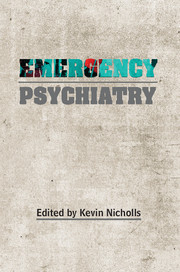Book contents
- Frontmatter
- Contents
- List of contributors
- Acknowledgements
- Preface
- 1 Assessment of suicide risk
- 2 Violence and aggression
- 3 Substance misuse emergencies
- 4 Alcohol and psychiatric emergencies
- 5 Acute psychosis
- 6 Acute side-effects of psychotropic medication
- 7 Emergencies in child and adolescent psychiatry
- 8 The psychiatric intensive care unit
- 9 Safeguarding
- 10 Emergency electroconvulsive therapy
- 11 Life-threatening medical emergencies in a mental health unit
- 12 Emergencies in intellectual disability psychiatry
- 13 Emergencies in older persons’ psychiatry
- 14 Perinatal psychiatric emergencies
- 15 Civilian and military psychological trauma
- 16 Emergencies in liaison psychiatry
- 17 Psychiatric emergencies in deaf people
- 18 Mental health law
- 19 Self-poisoning: aspects of assessment and initial care
- Index
9 - Safeguarding
Published online by Cambridge University Press: 01 January 2018
- Frontmatter
- Contents
- List of contributors
- Acknowledgements
- Preface
- 1 Assessment of suicide risk
- 2 Violence and aggression
- 3 Substance misuse emergencies
- 4 Alcohol and psychiatric emergencies
- 5 Acute psychosis
- 6 Acute side-effects of psychotropic medication
- 7 Emergencies in child and adolescent psychiatry
- 8 The psychiatric intensive care unit
- 9 Safeguarding
- 10 Emergency electroconvulsive therapy
- 11 Life-threatening medical emergencies in a mental health unit
- 12 Emergencies in intellectual disability psychiatry
- 13 Emergencies in older persons’ psychiatry
- 14 Perinatal psychiatric emergencies
- 15 Civilian and military psychological trauma
- 16 Emergencies in liaison psychiatry
- 17 Psychiatric emergencies in deaf people
- 18 Mental health law
- 19 Self-poisoning: aspects of assessment and initial care
- Index
Summary
‘All that is necessary for evil to triumph is for good men to do nothing.’ (attributed to Edmund Burke)
Safeguarding the welfare of vulnerable children and adults is increasingly a key strand in all comprehensive psychiatric and intellectual disability assessments. Safeguarding concerns can be part of an unfolding psychiatric emergency or constitute an emergency within otherwise routine care. Whatever the age of the patient, family circumstances, the impact of mental health problems, substance misuse and abusive behaviours now take centre stage in social assessments alongside the biological, medical and psychological aspects. This chapter will focus on safeguarding issues in emergency situations but the importance of recognising abuse as soon as possible, allowing early intervention to become part of the care offered in order to prevent, or protect from more serious harm occurring, is the aim.
This chapter will describe the nature of abuse and abusive behaviour, the harms caused, and the harmful impact of severe neglect and outline the legal framework relevant to safeguarding both children and vulnerable adults. A systematic approach to identifying, assessing and responding to abuse and neglect in routine care and as it presents in emergency situations will be proposed. Case studies will illustrate key issues for service providers and practitioners.
The ‘toxic triad’ of parental mental health problems, parental substance misuse and domestic violence is a particularly risk-laden environment for children to grow up in. Studies of serious case reviews consistently demonstrate the effects of these risk factors. Parental mental illness by itself does not necessarily mean parenting will be impaired and, with support and understanding, a child's vulnerability can be mitigated. However, the more difficulty a parent has in managing their own emotional distress or their use of drugs or alcohol, the more likely it is that the child will experience adverse consequences or actual harm. Where violence is also a feature, emotional harm is significantly increased. Studies suggest that more than 50% of children living in such households might also be physically abused (Hester & Pearson, 1998; Howe, 2005). The negative effects of growing up in chaotic and disturbed households are cumulative, potentially lifelong and, by virtue of the damaged attachment patterns created, can produce personality disturbances and future difficulties with parenting. Hence, for some families, abusive patterns repeat themselves down generations.
- Type
- Chapter
- Information
- Emergency Psychiatry , pp. 151 - 165Publisher: Royal College of PsychiatristsPrint publication year: 2015



